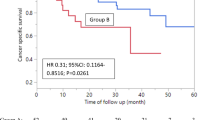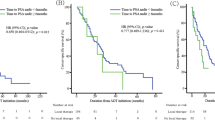Abstract
BACKGROUND:
Multiple phase-2 trials in men with biochemically-recurrent prostate cancer (BRPC) have assessed the impact of nonhormonal agents on PSA kinetics. We have previously demonstrated that changes in PSA kinetics correlate with metastasis-free survival; however, it is unknown whether these changes also correlate with overall survival (OS).
METHODS:
We performed a combined retrospective analysis of 146 men with BRPC treated on phase-2 trials using one of four investigational drugs: lenalidomide (n=60), marimastat (n=39), ATN-224 (n=22) and imatinib (n=25). We examined factors influencing OS, including within-subject changes in PSA kinetics (PSA slope, PSA doubling time and PSA velocity), before and 6 months after treatment initiation.
RESULTS:
After a median follow-up of 83.1 months, 49 of 146 men had died. In univariate Cox regression analysis, two factors were associated with OS: baseline PSA velocity and change in PSA velocity on therapy. In a landmark multivariable model, stratified by study (which controlled for age, Gleason score, type of local therapy and use of androgen-deprivation therapy prior to metastases), baseline PSA velocity and increase in PSA velocity on therapy remained independent predictors of OS. Median OS for men with an increase in PSA velocity on treatment was 115.4 months and was not reached for men with a decrease in PSA velocity (hazard ratio=0.47, 95% confidence interval 0.25–0.88; P=0.02).
CONCLUSIONS:
This hypothesis-generating study suggests that within-subject changes in PSA velocity after initiation of nonhormonal therapy may correlate with OS in men with BRPC. If validated in prospective trials, change in PSA velocity may represent a reasonable intermediate end point for screening new agents in these patients.
This is a preview of subscription content, access via your institution
Access options
Subscribe to this journal
Receive 4 print issues and online access
$259.00 per year
only $64.75 per issue
Buy this article
- Purchase on Springer Link
- Instant access to full article PDF
Prices may be subject to local taxes which are calculated during checkout

Similar content being viewed by others
References
Paller CJ, Antonarakis ES . Management of biochemically recurrent prostate cancer after local therapy: evolving standards of care and new directions. Clin Adv Hematol Oncol 2013; 11: 14.
Boccon‐Gibod L, Djavan B, Hammerer P, Hoeltl W, Kattan M, Prayer‐Galetti T et al. Management of prostate‐specific antigen relapse in prostate cancer: a European consensus. Int J Clin Pract 2004; 58: 382–390.
Moul JW, Wu H, Sun L, McLeod DG, Amling C, Donahue T et al. Early versus delayed hormonal therapy for prostate specific antigen only recurrence of prostate cancer after radical prostatectomy. J Urol 2004; 171: 1141–1147.
Smith MR, Manola J, Kaufman DS, George D, Oh WK, Mueller E et al. Rosiglitazone versus placebo for men with prostate carcinoma and a rising serum prostate‐specific antigen level after radical prostatectomy and/or radiation therapy. Cancer 2004; 101: 1569–1574.
Rosenbaum E, Zahurak M, Sinibaldi V, Carducci MA, Pili R, Laufer M et al. Marimastat in the treatment of patients with biochemically relapsed prostate cancer: a prospective randomized, double-blind, phase I/II trial. Clin Cancer Res 2005; 11: 4437–4443.
Bajaj GK, Zhang Z, Garrett-Mayer E, Drew R, Sinibaldi V, Pili R et al. Phase II study of imatinib mesylate in patients with prostate cancer with evidence of biochemical relapse after definitive radical retropubic prostatectomy or radiotherapy. Urology 2007; 69: 526–531.
Smith MR, Manola J, Kaufman DS, Oh WK, Bubley GJ, Kantoff PW . Celecoxib versus placebo for men with prostate cancer and a rising serum prostate-specific antigen after radical prostatectomy and/or radiation therapy. J Clin Oncol 2006; 24: 2723–2728.
Lin J, Zahurak M, Beer TM, Ryan CJ, Wilding G, Mathew P et al. A non-comparative randomized phase II study of 2 doses of ATN-224, a copper/zinc superoxide dismutase inhibitor, in patients with biochemically recurrent hormone-naive prostate cancer. Urol Oncol 2013; 31: 581–588.
Urba WJ, Nemunaitis J, Marshall F, Smith DC, Hege KM, Ma J et al. Treatment of biochemical recurrence of prostate cancer with granulocyte-macrophage colony-stimulating factor secreting, allogeneic, cellular immunotherapy. J Urol 2008; 180: 2011–2018.
McNeel DG, Dunphy EJ, Davies JG, Frye TP, Johnson LE, Staab MJ et al. Safety and immunological efficacy of a DNA vaccine encoding prostatic acid phosphatase in patients with stage D0 prostate cancer. J Clin Oncol 2009; 27: 4047–4054.
Schweizer M, Zhou X, Wang H, Yang T, Shaukat F, Partin A et al. Metastasis-free survival is associated with overall survival in men with PSA-recurrent prostate cancer treated with deferred androgen deprivation therapy. Ann Oncol 2013; 24: 2881–2886.
Petrylak DP, Ankerst DP, Jiang CS, Tangen CM, Hussain MH, Lara PN et al. Evaluation of prostate-specific antigen declines for surrogacy in patients treated on SWOG 99-16. J Natl Cancer Inst 2006; 98: 516–521.
Hussain M, Tangen CM, Higano C, Schelhammer PF, Faulkner J, Crawford ED et al. Absolute prostate-specific antigen value after androgen deprivation is a strong independent predictor of survival in new metastatic prostate cancer: data from Southwest Oncology Group Trial 9346 (INT-0162). J Clin Oncol 2006; 24: 3984–3990.
Keizman D, Zahurak M, Sinibaldi V, Carducci M, Denmeade S, Drake C et al. Lenalidomide in nonmetastatic biochemically relapsed prostate cancer: results of a phase I/II double-blinded, randomized study. Clin Cancer Res 2010; 16: 5269–5276.
Antonarakis ES, Zahurak ML, Lin J, Keizman D, Carducci MA, Eisenberger MA . Changes in PSA kinetics predict metastasis‐free survival in men with PSA‐recurrent prostate cancer treated with nonhormonal agents. Cancer 2012; 118: 1533–1542.
Pound CR, Partin AW, Eisenberger MA, Chan DW, Pearson JD, Walsh PC . Natural history of progression after PSA elevation following radical prostatectomy. JAMA 1999; 281: 1591–1597.
D'Amico AV, Chen M, Roehl KA, Catalona WJ, Preoperative PSA . velocity and the risk of death from prostate cancer after radical prostatectomy. N Engl J Med 2004; 351: 125–135.
Kaplan EL, Meier P . Nonparametric estimation from incomplete observations. J Am Statist Assoc 1958; 53: 457–481.
Brookmeyer R, Crowley J . A confidence interval for the median survival time. Biometrics 1982; 38: 29–41.
Antonarakis ES, Feng Z, Trock BJ, Humphreys EB, Carducci MA, Partin AW et al. The natural history of metastatic progression in men with prostate‐specific antigen recurrence after radical prostatectomy: long‐term follow‐up. BJU Int 2012; 109: 32–39.
Antonarakis ES, Chen Y, Elsamanoudi SI, Brassell SA, Da Rocha MV, Eisenberger MA et al. Long‐term overall survival and metastasis‐free survival for men with prostate‐specific antigen‐recurrent prostate cancer after prostatectomy: analysis of the Center for Prostate Disease Research National Database. BJU Int 2011; 108: 378–385.
D’Amico AV, Renshaw AA, Sussman B, Chen M . Pretreatment PSA velocity and risk of death from prostate cancer following external beam radiation therapy. JAMA 2005; 294: 440–447.
King CR, Presti JC, Brooks JD, Gill H, Spiotto MT . Postoperative prostate-specific antigen velocity independently predicts for failure of salvage radiotherapy after prostatectomy. IntJ Radiat Oncol Biol Phys 2008; 70: 1472–1477.
Armstrong AJ, Garrett-Mayer E, Yang YO, Carducci MA, Tannock I, de Wit R et al. Prostate-specific antigen and pain surrogacy analysis in metastatic hormone-refractory prostate cancer. J Clin Oncol 2007; 25: 3965–3970.
Halabi S, Armstrong AJ, Sartor O, de Bono J, Kaplan E, Lin C et al. Prostate-specific antigen changes as surrogate for overall survival in men with metastatic castration-resistant prostate cancer treated with second-line chemotherapy. J Clin Oncol 2013; 31: 3944–3950.
Paller C, Olatoye D, Xie S, Zhou X, Denmeade S, Eisenberger M et al. The effect of the frequency and duration of PSA measurement on PSA doubling time calculations in men with biochemically recurrent prostate cancer. Prostate Cancer Prostatic Dis 2013; 17: 28–33.
Acknowledgements
This work was partially supported by NIH grants P30 CA006973 (ESA) and T32CA009071 (DLS).
Author information
Authors and Affiliations
Corresponding author
Ethics declarations
Competing interests
The authors declare no conflict of interest.
Additional information
Supplementary Information accompanies the paper on the Prostate Cancer and Prostatic Diseases website
Supplementary information
Rights and permissions
About this article
Cite this article
Suzman, D., Zhou, X., Zahurak, M. et al. Change in PSA velocity is a predictor of overall survival in men with biochemically-recurrent prostate cancer treated with nonhormonal agents: combined analysis of four phase-2 trials. Prostate Cancer Prostatic Dis 18, 49–55 (2015). https://doi.org/10.1038/pcan.2014.44
Received:
Revised:
Accepted:
Published:
Issue Date:
DOI: https://doi.org/10.1038/pcan.2014.44



